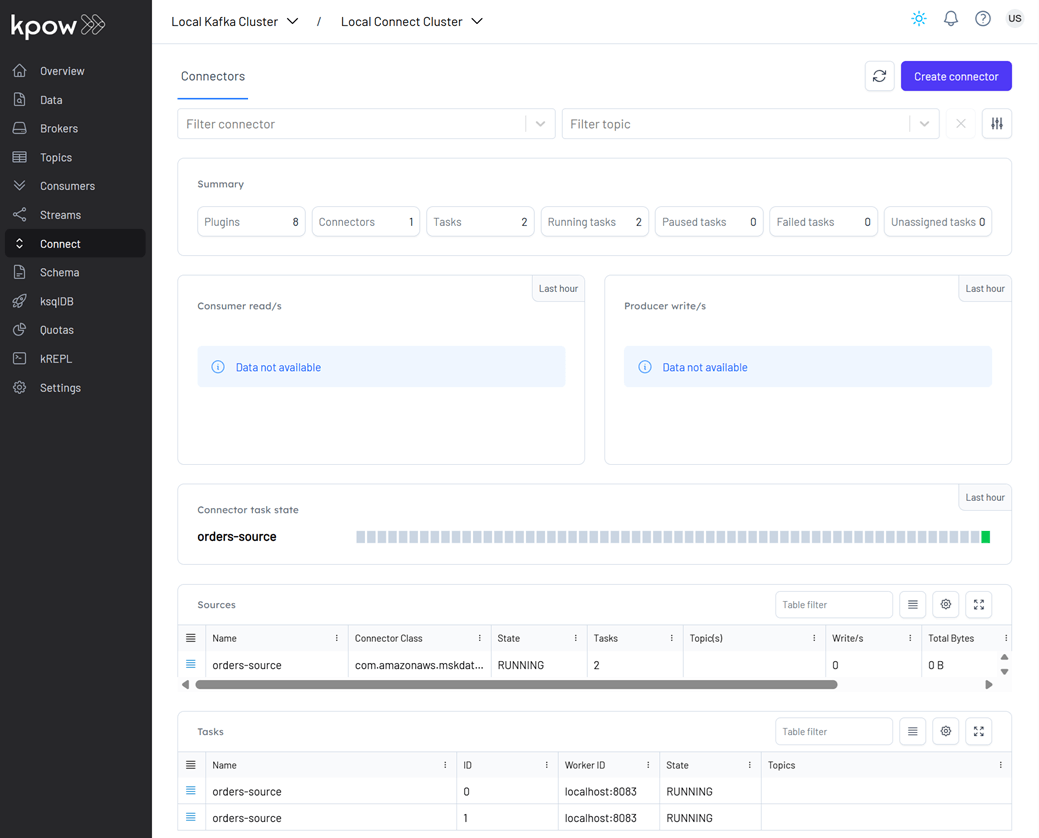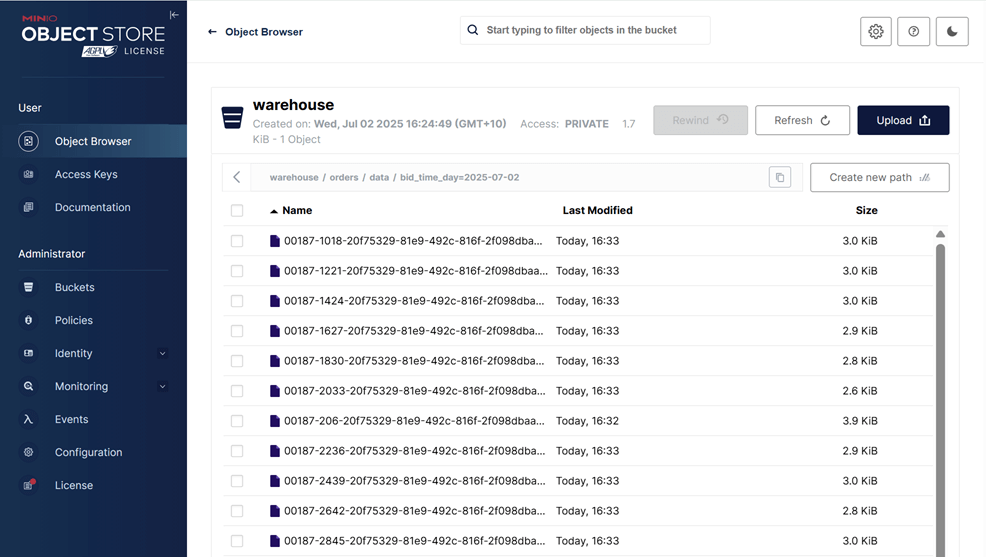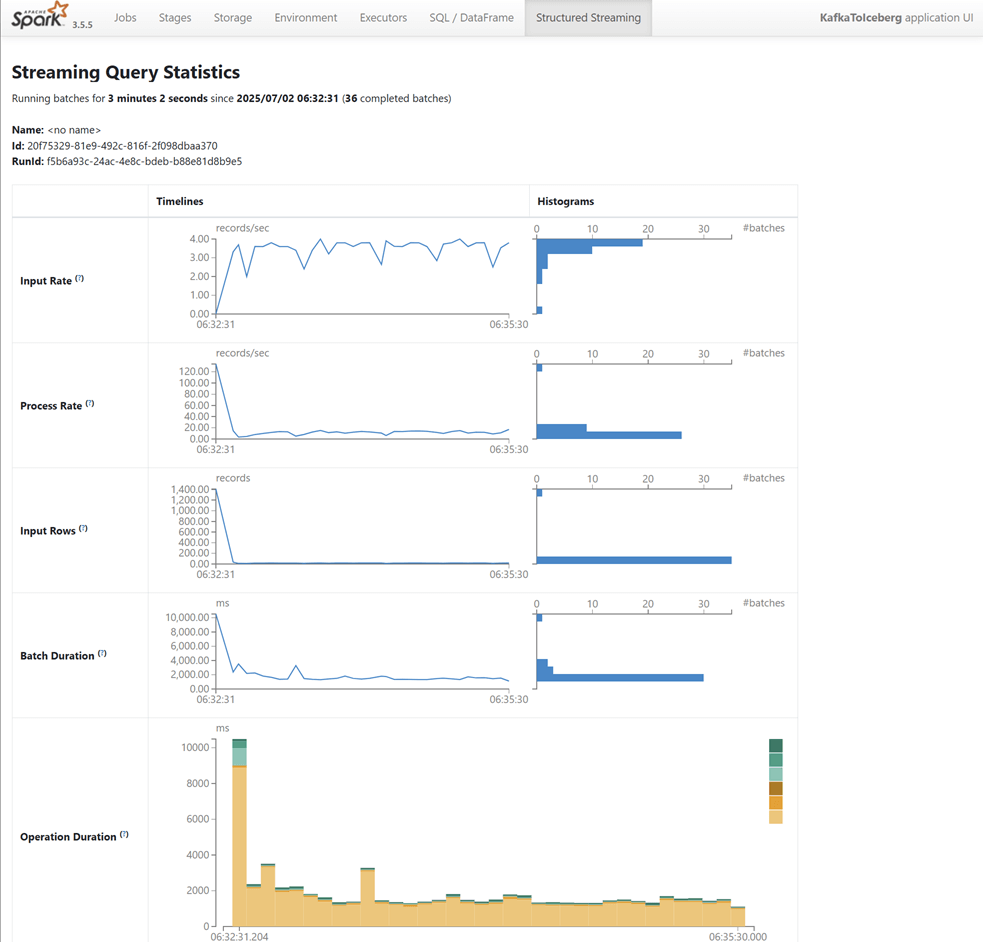Lab 10: Spark Structured Streaming - Delivering Kafka Order Records into Iceberg Table
Build a PySpark Structured Streaming job that ingests Kafka order data, deserializes Avro messages using ABRiS, and writes the results to Iceberg. The job is packaged as a fat JAR and outputs partitioned Parquet files to MinIO.
How to start
Clone project repository
git clone https://github.com/factorhouse/examples.git
cd examples
Start Kafka and Flink environments
We'll use Factor House Local to quickly spin up a Kafka environment that includes Kpow as well as an analytics environment for Iceberg. We can use either the Community or Enterprise editions of Kpow/Flex. To begin, ensure valid licenses are available. For details on how to request and configure a license, refer to this section of the project README.
## Clone the Factor House Local Repository
git clone https://github.com/factorhouse/factorhouse-local.git
## Download Kafka/Flink Connectors and Spark Iceberg Dependencies
./factorhouse-local/resources/setup-env.sh
## Uncomment the sections to enable the edition and license.
# Edition (choose one):
# unset KPOW_SUFFIX # Enterprise
# unset FLEX_SUFFIX # Enterprise
# export KPOW_SUFFIX="-ce" # Community
# export FLEX_SUFFIX="-ce" # Community
# Licenses:
# export KPOW_LICENSE=<path-to-license-file>
# export FLEX_LICENSE=<path-to-license-file>
docker compose -p kpow -f ./factorhouse-local/compose-kpow.yml up -d \
&& docker compose -p flex -f ./factorhouse-local/compose-flex.yml up -d
Persistent Catalogs
Two catalogs are pre-configured in both the Flink and Spark clusters:
demo_hv: a Hive catalog backed by the Hive Metastoredemo_ib: an Iceberg catalog also backed by the Hive Metastore
Flink
In Flink, the catalogs can be initialized automatically using an SQL script (init-catalogs.sql) on startup:
CREATE CATALOG demo_hv WITH (
'type' = 'hive',
'hive-conf-dir' = '/opt/flink/conf',
'default-database' = 'default'
);
CREATE CATALOG demo_ib WITH (
'type' = 'iceberg',
'catalog-type' = 'hive',
'uri' = 'thrift://hive-metastore:9083'
);
Spark
In Spark, catalog settings are defined in spark-defaults.conf:
# Enable Iceberg extensions
spark.sql.extensions org.apache.iceberg.spark.extensions.IcebergSparkSessionExtensions
# Hive catalog (demo_hv)
spark.sql.catalog.demo_hv org.apache.iceberg.spark.SparkCatalog
spark.sql.catalog.demo_hv.type hive
spark.sql.catalog.demo_hv.hive.metastore.uris thrift://hive-metastore:9083
spark.sql.catalog.demo_hv.warehouse s3a://warehouse/
# Iceberg catalog (demo_ib)
spark.sql.catalog.demo_ib org.apache.iceberg.spark.SparkCatalog
spark.sql.catalog.demo_ib.type hive
spark.sql.catalog.demo_ib.uri thrift://hive-metastore:9083
spark.sql.catalog.demo_ib.io-impl org.apache.iceberg.aws.s3.S3FileIO
spark.sql.catalog.demo_ib.s3.endpoint http://minio:9000
spark.sql.catalog.demo_ib.s3.path-style-access true
spark.sql.catalog.demo_ib.warehouse s3a://warehouse/
# Optional: set default catalog
spark.sql.defaultCatalog spark_catalog
Deploy source connector
We will create a source connector that generates fake order records to a Kafka topic (orders). See the Kafka Connect via Kpow UI and API lab for details about how to create the connector.
Once deployed, we can check the connector and its tasks in Kpow.

Deploy PySpark application
This PySpark streaming application reads Avro-encoded Kafka messages, deserializes them using ABRiS, and writes the structured data into an Iceberg table. It does the following:
- Configures ABRiS to fetch schemas from Confluent Schema Registry using topic-based strategy.
- Defines helper functions to build ABRiS config and apply Avro deserialization to PySpark columns.
- Reads Kafka messages as a stream and extracts fields like
order_id,item,price,supplier, andbid_time. - Creates the Iceberg table if it doesn’t exist, partitioned by
DAY(bid_time)and optimized with write properties. - Writes streaming data to Iceberg in append mode with checkpointing and 5-second processing triggers.
- Logs key events and supports graceful shutdown on termination or failure.
While the spark-iceberg container includes the necessary Iceberg dependencies, additional dependencies are required to read from the Kafka topic (orders) and to deserialize Avro messages using schemas registered in the Schema Registry. Although the spark-submit command supports adding dependencies via the --packages flag, it may not include all required libraries reliably.
To address this, we create an Uber (fat) JAR that bundles all dependencies. This JAR will later be referenced using the --jars flag during submission. You can build the JAR using the ./gradlew build command as shown below. If Gradle is not installed, refer to this page for installation instructions.
cd fh-local-labs/lab-10
./gradlew build
Upon successful build, the JAR file fh-local-spark-orders-iceberg-1.0.jar will be located in the build/libs directory. This JAR, along with the main PySpark application (kafka_to_iceberg.py), will be used to run the job.
kafka_to_iceberg.py # <- PySpark app
build/libs/
└── fh-local-spark-orders-iceberg-1.0.jar # <- uber Jar
Next, copy the PySpark script and the Uber JAR into the running spark-iceberg container using the docker cp command:
# cd fh-local-labs/lab-10
docker cp kafka_to_iceberg.py \
spark-iceberg:/tmp/kafka_to_iceberg.py
docker cp build/libs/fh-local-spark-orders-iceberg-1.0.jar \
spark-iceberg:/tmp/fh-local-spark-orders-iceberg-1.0.jar
Once copied, submit the application using the following spark-submit command:
docker exec -it spark-iceberg \
/opt/spark/bin/spark-submit \
--master local[*] \
--jars /tmp/fh-local-spark-orders-iceberg-1.0.jar \
/tmp/kafka_to_iceberg.py
We can verify the output by inspecting the Parquet files written by the sink. These files are accessible via MinIO at http://localhost:9001 using admin as the username and password as the password. As shown in the screenshot below, the records have been successfully written to the appropriate partitions in the warehouse bucket.

Additionally, you can monitor the job in real time using the Spark Web UI at http://localhost:4040 while the application is running, or review completed jobs later via the Spark History Server at http://localhost:18080.

Shutdown environment
Finally, stop and remove the Docker containers.
If you're not already in the project root directory, navigate there first. Then, stop and remove the Docker containers by running:
# Stops the containers and unsets environment variables
docker compose -p flex -f ./factorhouse-local/compose-flex.yml down \
&& docker compose -p kpow -f ./factorhouse-local/compose-kpow.yml down
unset KPOW_SUFFIX FLEX_SUFFIX KPOW_LICENSE FLEX_LICENSE